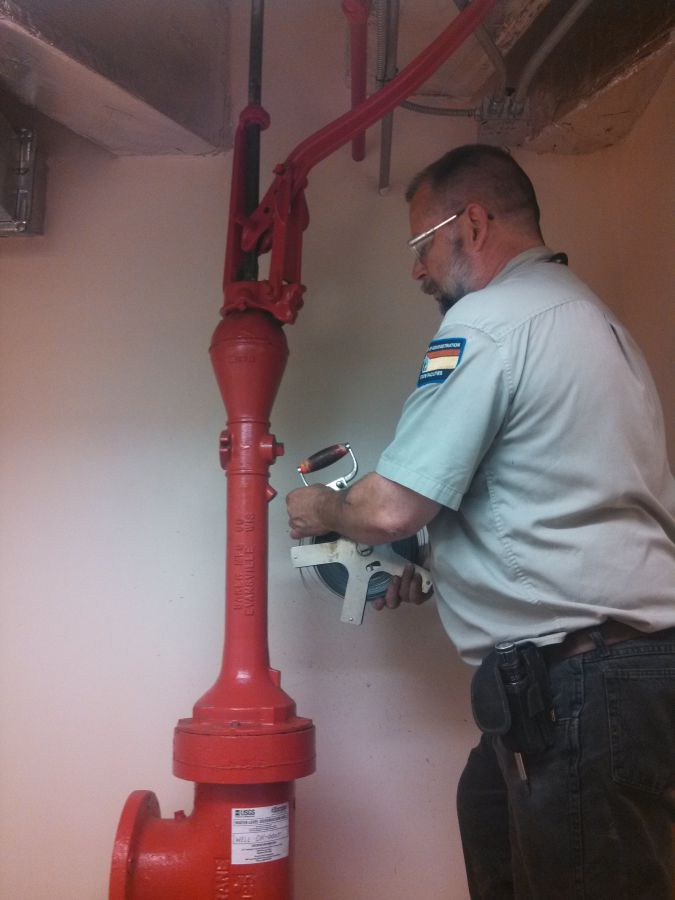How low can we go?
posted
Madison's annual water use hits a 47-year low, but utility officials push for more.
.jpg)
(Photo: Pump test for Well 31 on Madison's southeast side. It will be the city's first new well in more than a decade.)
---
Madison has 81,000 more people than it had in 1968, but believe it or not, the city is using about the same amount of water. For the first time in 47 years, annual water use in Madison has dropped below 10 billion gallons. In 2015, Madison Water Utility pumped 9.98 billion gallons of water to homes, schools and businesses across the city. In 1968, that number was about 9.5 billion.
“I think it’s more efficient washing machines and toilets. And industry in Madison uses less water now too,” says Madison Water Utility water supply manager Joe DeMorett.
The drop marks a major conservation milestone for Madison. In 2001, water use peaked at more than 12 billion gallons, but since then, it has been on the decline. The decline has also brought rebounding water levels in Madison’s underground aquifer, a vast deposit of saturated sandstone that has been the main source of drinking water for the city since 1882.
“We must protect the resources that we have – leave as much water in the ground as we can, and reduce our carbon footprint by not having to use as much energy to pump the water,” says Madison Water Utility chief administrative officer Robin Piper. “If we continued to use water at the rate that we had been, we’d be drawing down an aquifer that is not infinite.”
Data gathered by the United States Geological Survey (USGS) from a small well in the basement of the Capitol Building show water levels in that part of the aquifer were on a decline from the 1950s to the late 1990s, dropping to a record depth of more than 130 feet in 1998. To some extent, the decline mirrors Madison Water Utility’s pumpage records, which show a steady increase in the amount of water pumped from the aquifer during the same time period. But since water use in the city began dropping 15 years ago, the aquifer appears to be bouncing back.
“(The aquifer) is a resource that we’re really blessed to have. You don’t want to go from a surplus to a mining situation where you’re not replenishing it,” says DeMorett.

(Photo left: A 141 year-old water well in the Capitol basement has provided critical aquifer data since the early 1900s.)
Encouraging conservation
Madison Water Utility has also been working hard to encourage consumer conservation. Its popular Toilet Rebate Program has saved an estimated half-billion gallons of water since its launch 2009, and the utility recently expanded the program to include commercial and industrial customers. And in 2014, the utility unveiled its web-based conservation tool that allows customers to track their weekly, daily and even hourly water use online. MWU was the first water utility in the midwest to bring that kind of detailed usage data directly to customers. So far, more than 6,500 people have logged on to use the tool.
“The novelty may wear off for a few customers, but I think there are some who are truly interested in seeing how the water that they use impacts their bills. You need the knowledge of how you’re using water and when you’re using water to be able to conserve it," says Piper.
But it isn't just customer use that's been a focus. Madison Water Utility employees have been studying the utility’s own pumpage patterns to better understand how each well impacts the aquifer. Madison has 22 high-capacity municipal water wells operating across the city, and some are used more than others.
“I monitor all the wells and look at all the water levels to see if anything is changing," explains DeMorett, who has been working to spread pumping out more evenly at wells across the city to minimize localized drawn down of the aquifer. He admits, there is still an impact, especially during the summer months. "Of course (levels at) some of the wells do change. I think we have to keep a really good eye on it."
It’s hard to imagine running out of water in what has always been a water-rich city, but as global temperatures rise and weather patterns shift, DeMorett says Madison’s fortunes could change rapidly. He insists that’s why it’s critical to focus on conservation now as we look ahead to an uncertain future.
“As long as the climate stays the same we’ll probably be okay, but (he pauses), who knows?”
